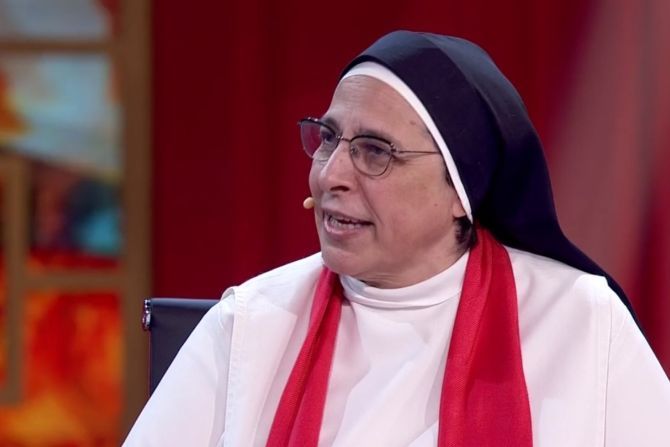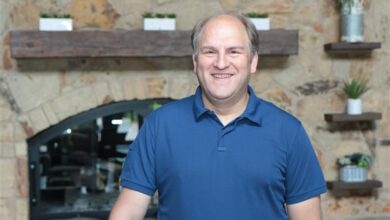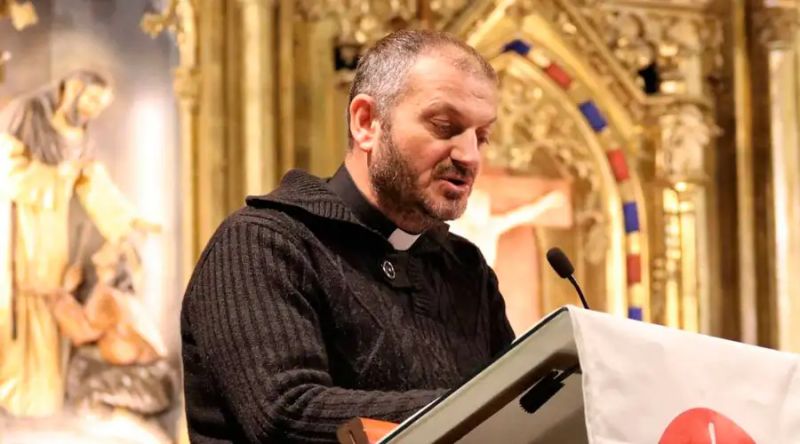Dominican nun speaks in favor of homosexuals being able to marry in the Church
 Dominican Sister Lucía Caram on the television program “Cuentos Chinos” (“Tall Tales”) in Spain. / Credit: Mediaset
Dominican Sister Lucía Caram on the television program “Cuentos Chinos” (“Tall Tales”) in Spain. / Credit: Mediaset ACI Prensa Staff, Sep 22, 2023 / 18:00 pm (CNA).
Dominican Sister Lucía Caram, who lives in Spain but is Argentinian, said during a recent television program that she is in favor of homosexual couples being able to “marry in the Church.”
In the show called “Cuentos Chinos” (“Tall Tales”), host Jorge Javier Vázquez, who is openly homosexual, asked the religious: “Would you be in favor of gays getting married in the Church?” to which the nun responded: “I would be in favor of gays getting married in the Church because God always blesses love.”
In a previous comment, Caram also noted: “My best friend is gay. He’s Juan Carlos Cruz, who is a global LGTBI leader.”
Cruz is a Chilean activist and a victim of sexual abuse by the late Fernando Karadima, a priest who was dismissed from the clerical state.
In March 2021, Cruz was appointed by Pope Francis as a member of the Pontifical Commission for the Protection of Minors chaired by the archbishop of Boston, Cardinal Sean O’Malley.
When asked if two men who have sexual relations would be committing sin, Caram said: “I am not anyone to say that someone commits sin in anything. I think each person knows. To commit a sin… It is very complicated to want to do wrong. I am nobody to condemn anyone. And Jesus says we should not condemn anyone. So I would not condemn or say ‘this is a sin or this is not a sin.’ Not about anyone.”
The television host then asked if the nun would recommend two homosexual people to have sexual relations. “If they love each other… What do you want me to tell you! They do not have the vow of chastity that I have,” she responded.
The Catechism of the Catholic Church dedicates paragraphs 2357-2359 to chastity and homosexuality. The Church teaches that homosexual acts “are intrinsically disordered. They are contrary to the natural law. They close the sexual act to the gift of life. They do not proceed from a genuine affective and sexual complementarity. Under no circumstances can they be approved.”
The Catechism also states that homosexual inclination constitutes for most people “a trial” and therefore “they must be accepted with respect, compassion, and sensitivity,” avoiding “all signs of unjust discrimination.” These people are called “if they are Christians, to unite to the sacrifice of the Lord’s cross the difficulties they may encounter from their condition.”
Finally, the compendium of the Church’s faith states that “homosexual people are called to chastity” and are encouraged to “by the virtues of self-mastery” with the support of disinterested friendship, prayer, and sacramental grace “to gradually and resolutely approach Christian perfection.”
After the nun’s response, the host of the program stated that Caram ought to be pope, to which she replied: “No. With Francisco we are very well. We have the best pope in history.”
When asked by ACI Prensa, CNA’s Spanish-language news partner, sources at the Order of Preachers in Spain explained that “the friars of Spain do not have any type of legal or canonical authority over the sisters” and that they understand that “Sister Lucía’s opinions or her statements are not in the name of the order; they are personal.”
In 2017, Caram sparked another controversy on a television program by questioning a principal dogma about Mary, the Mother of God. The sister said she understands that it is “very difficult to believe, to adhere to the issue of Mary’s virginity.”
Furthermore, the Dominican stated on that occasion that the Virgin Mary and St. Joseph had the relationship of a “normal couple,” which involved “having sex and having the normal relationship of a couple.”
On that occasion, the federation of Dominican nuns of the Immaculate Conception, which encampasses monasteries from Spain, Argentina, and Chile, said in a statement that “her status as a contemplative Dominican is not compatible with her activity in the communications media especially in those where the most sacred truths of our Catholic faith are denied and ridiculed.”
This story was first published by ACI Prensa, CNA’s Spanish-language news partner. It has been translated and adapted by CNA.





